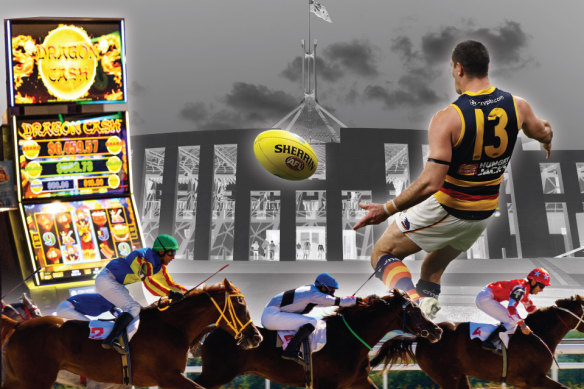Amid the growing furore over gambling advertising, Australian sporting codes are hoping for a watering-down of the late Peta Murphy’s proposed reforms.
The basis of their claim is that the substantial revenue they receive from their association with wagering firms is essential to the health of sporting codes across Australia. But what exactly do these codes mean when they talk about the health of the sport?

Australian sporting codes are hoping for a watering-down of the late Peta Murphy’s proposed gambling reforms.Credit: Fairfax Media
The deals sporting bodies strike with gambling allows them to earn revenue that, we are told, is used to further develop the sport. True enough, I’m sure, but all gambling revenue comes with a widely acknowledged serious risk to the integrity of the sport. And although our sporting codes swear integrity is paramount, their performance suggests otherwise.
The Australian sports betting model was established through state legislation in Victoria in 2007. Under this model, sporting codes apply to become a registered sports controlling body (SCB), and status is granted once the state regulator is satisfied that the code has put in place sufficient integrity measures to monitor the behaviour of those under its control, educate participants of the risks of gambling corruption, and investigate match-fixing activity.
Once SCB registration is obtained, the sporting code is free to enter partnerships with wagering operators who will, not surprisingly, propose any number of betting types, known as contingencies. Once a contingency is approved, the code receives a percentage of the revenue generated.
What our sporting codes have failed to understand is that wagering bodies are experts at seeking out every conceivable betting opportunity, all designed to generate revenue for them regardless of the risk it presents to the integrity of the specific sport. And the risks vary widely. Betting on a best-and-fairest award determined by votes cast by officials over a long season presents a much smaller integrity risk than betting on an award determined by a single person, for example.
The scheme envisages that each code’s integrity team will undertake a rigorous risk assessment when wagering firms seek approval for new bet types. Sadly, this doesn’t happen often enough, if at all.
The AFL’s lack of preparedness for the sports gambling world it entered was exposed in 2014 when it was revealed that betting continued on its Rising Star Award in the days between the winner being determined privately by a panel of judges and award night. Blind Freddy would have recognised the arrangement as opening the door to insider betting, but it took media exposure for the AFL to respond. Though the AFL survived the regulator’s investigation and promised to do better, last year’s Brownlow Medal voting controversy showed it had learned nothing. The wagering industry’s request to allow punters to bet on the round-by-round Brownlow voting meant the umpires in each match became privy to inside information while betting was under way.
As another example, Tennis Australia continues to allow wagering operators to run betting markets on set outcomes in minor tournaments, an open invitation for corruption given the participants stand to win modest prize money and are susceptible to overtures by crooks to conveniently drop a set for greater financial gain. Even after a player was found guilty of match fixing at a minor tournament in 2016, Tennis Australia failed to act. Over the coming Australian summer, the same betting opportunities will be available to punters, and players will continue to be approached by match-fixers.
The plea by sporting codes against a gambling ad ban ignores an obvious truth. Any benefit they receive must be weighed against the true costs, of which there are at least three.
First, each is required to fund a growing integrity team, but the above examples demonstrate that these are under-resourced. Second, there is an indisputable cost associated with the reputational damage caused by gambling scandals. Third, codes overlook the harm that players are copping from irritated punters who bombard them with derogatory commentary and threats following unfavourable results.
Where is the accountability of the peak sporting body that decides to allow that betting in the first place? How long before players sue those responsible?
Any comprehensive assessment will show the economic benefit is marginal, and will degrade as the pushback of fans against gambling advertising grows. Add to this the cost of keeping up with the untiring efforts of match-fixers. Every sporting administrator worth their salt knows that integrity threats are growing. Anyone doubting it should consider the never-ending stream of Tennis Integrity Unit media releases advising of another suspension due to match-fixing offences.
Australians love their sport, and yes, we love a bet. But we don’t appreciate endless gambling advertising. A balance needs to be struck, and our sporting codes can show some leadership by learning to say no. No to endless free-to-air media ads. No to arena and uniform branding. No to new and totally unsuitable betting types.
Learn to say no, and the integrity of Australian sport will survive. Become an echo chamber for the gambling industry, and watch the trust and reputation of our great codes diminish even further.
Tony Robinson is a former Victorian minister for gambling.
The Opinion newsletter is a weekly wrap of views that will challenge, champion and inform your own. Sign up here.